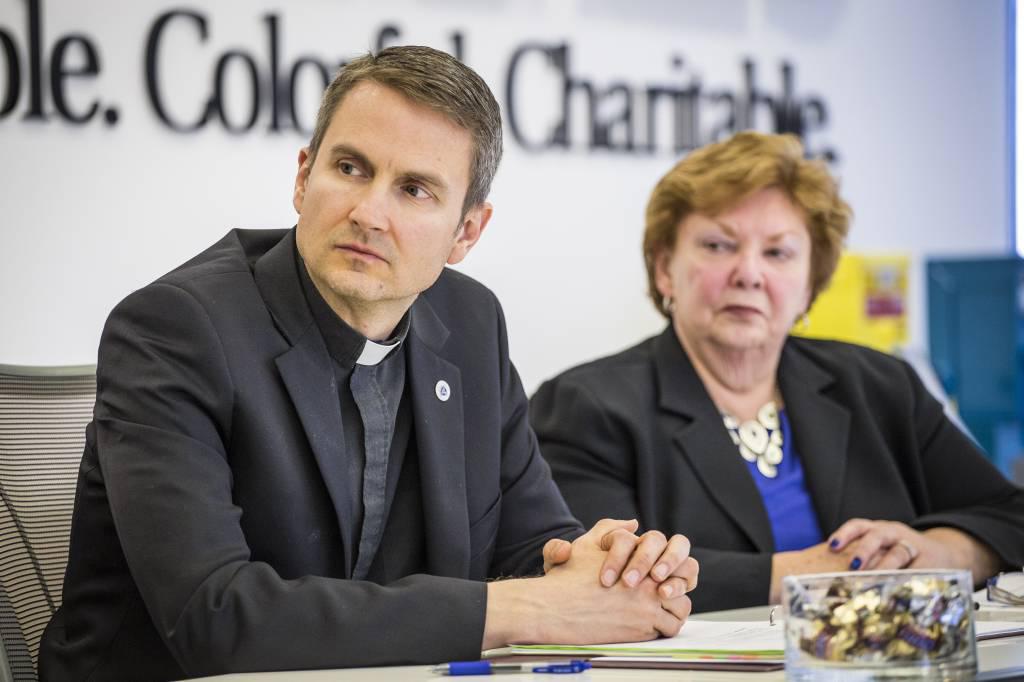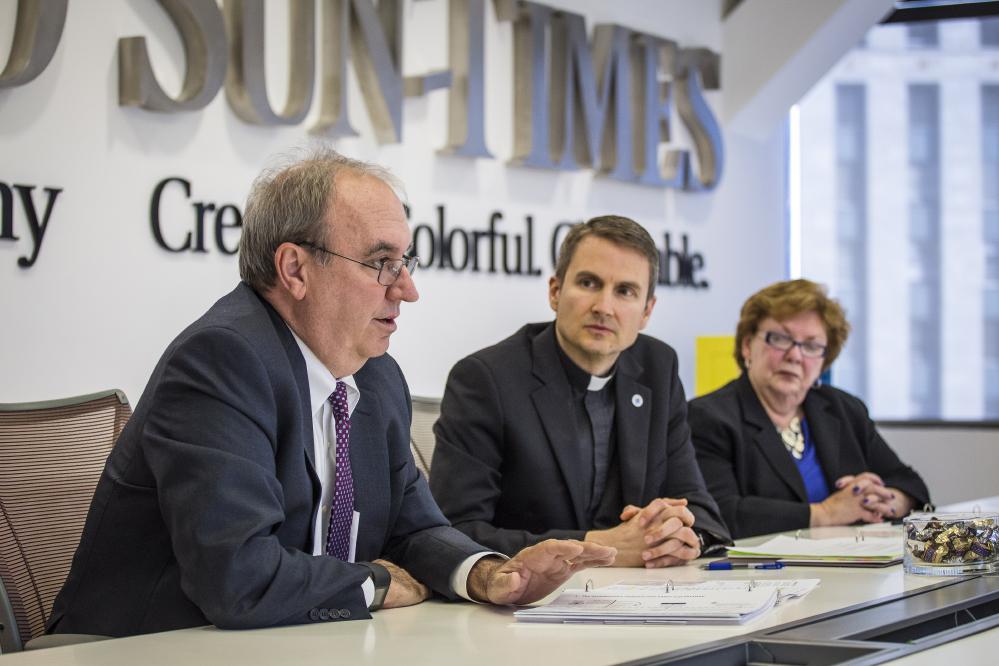|
Archdiocese defends record as film about Boston priest abuse nears release
By Mitch Dudek
[with video] In an unprecedented public relations maneuver, top Chicago Archdiocese officials met with several newspapers this week — days before the big screen release of a star-studded Hollywood drama depicting the Boston Globe’s 2002 expose on clergy sex abuse — to say, basically: “Don’t confuse us with Boston.” Vicar General Ronald Hicks, second-in-command to Archbishop Blase Cupich, explained the proactive stance to the Sun-Times’ editorial board earlier this week. “We think there’s a possibility that there’s going to be new energy and new questions around this and what we want to do is make sure that the media knows that Chicago is extremely different in handling the case of clerical sexual abuse of minors than Boston and how it’s being portrayed in the movie.” Actors Michael Keaton, Rachel McAdams and Mark Ruffalo play the journalists behind the Pulitzer-Prize-winning stories that shook the world in 2002, and ultimately encouraged a large number of victims in other cities, including Chicago, to come forth with their own tales of abuse, setting off a global crisis for the church. The film, “Spotlight,” debuts locally at the Chicago Film Festival Oct. 29 and is scheduled for wider release Nov. 6. Hicks called the scandals a “tragic and a painful part of our history,” and looked to John O’Malley, an attorney for the archdiocese who handles misconduct cases, to help argue that in handling priest sex abuse, Chicago and Boston have little in common. O’Malley pointed to first-of-a-kind policies put in place by then-Cardinal Joseph Bernardin in 1992 — a decade before the Boston Globe shined a light on the problem. The safeguards included a review board composed mostly of lay people who advised the archbishop on issues of fitness for ministry and risk to children. “The whole process was mandated to cooperate with civil authorities,” said O’Malley, who added that the Boston Archdiocese put in a program after Chicago which “kind of looked like Chicago, but it was not lay-dominated, and the investigative process was controlled by clerics.” After the Globe stories were published in 2002, bishops from around the country met in Dallas and enacted policies that were adopted nationally. O’Malley said those measures strengthened the rules already in place in Chicago — for instance, by adding background checks and a one-strike-you’re-out rule. The decision to meet with news outlets this week in Chicago, O’Malley said, was made at the local level and was not part of a national campaign. “The group of us involved in this heard about the movie. I think a couple of us saw the trailers. We had the sense that there were different issues in Boston than here, and we better get in front of this,” he said. O’Malley said there was a sharp decrease in abuse after 1992 policies went into effect. “Only six [priests] have abused since 1992 and one of those six is Daniel McCormack,” said O’Malley, referring to the defrocked former priest who once served at St. Agatha’s on the West Side. “The radar was on. He flew under the radar. I think that can happen, and that’s why you have to be vigilant,” O’Malley said. As a case was pending to find out if McCormack was an abuser, the review board recommended McCormack be withdrawn from ministry. “Cardinal George did not agree with that recommendation; his reasoning was, he thought the canonical process that had been put in place in 2002 did not allow for removal until the canonical process was over,” O’Malley said. “So he had his reason, and he did not withdraw McCormack, and the firestorm arose around that,” O’Malley added. “That was a very significant regret for (George).” O’Malley said the discretion for removing a priest in such a matter still lies in the hands of the archbishop, though “I’m not aware that any recommendation of the review board has not been followed since,” he said. In the history of the Chicago Archdiocese, there have been 385 substantiated allegations of abuse against 65 priests, all of whom are listed on a church website. A large portion of the pending litigation against the church — there are about 60 active cases — involve McCormack. The Chicago Archdiocese has paid about $120 million to victims, O’Malley said. Attorney Jeff Anderson has represented abuse victims in Chicago for decades. “The practices in Chicago in the ’80s and before mirror Boston,” he said. “In the ’90s, however, I do give them credit for going farther than other dioceses in the country had because they made some efforts and did not entirely ignore the problem. Did they take it far enough, soon enough? No. Far from it.” Anderson said that, in handling cases against the archdiocese, he always refused any confidentiality clause the archdiocese wanted, which helped drag the problem into the light. Chicago Archdiocese spokeswoman Susan Burritt said that in 2002, after the Globe stories, bishops in the United States decided to stop seeking confidentiality clauses. She said Cardinal George took the decision a step further and elected not to enforce any previous confidentiality clauses. “They continue to evolve,” Anderson said. “Now we find them to be much more forthcoming than many of the dioceses in the country in terms of facing the transparency issue and making some of the disclosures.” In January and November of 2014, the Chicago Archdiocese made public thousands of documents that detailed cases of sexual abuse dating back decades. The delay in the release and information that was redacted largely was due to protecting the privacy of victims who wanted to remain anonymous. The problem of sex abuse is a human one, and will not go away, O’Malley said. “It’s not over. It will never be over. But any institution that cares for children has this issue. People are going to come to that institution for the wrong reason, so they can get next to children. We’re trying to deal with it. . . . We’re now trying to tell our story and here we are.” Chicago is well positioned going forward, Hicks said, because of Cupich’s experience as chair of the U.S. Conference of Catholic Bishop’s committee for the protection of children and young people from 2008 to 2011. “He brings a lot of depth and serious understanding and commitment to this issue,” said Hicks. “We’re proud of what we’ve done here and we want to continue making sure that we are protecting God’s children day after day.” O’Malley said the group’s intention was not to disparage the movie. Far from it, he said. “I loved the trailer,” he said. “It’s powerful.” The film’s director, Thomas McCarthy, made his behind-the-camera debut with “The Station Agent,” starring Peter Dinklage. He may be better known for his acting roles, however, including one as Scott Templeton, the unethical newspaper reporter in the final season of HBO’s “The Wire.”
|
.
Any original material on these pages is copyright © BishopAccountability.org 2004. Reproduce freely with attribution.

